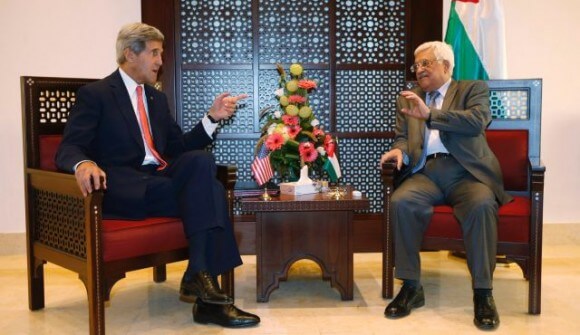
Yesterday, Maariv (Hebrew) said that U.S. Secretary of State John Kerry pressured the Palestinian Authority by threatening to delay the next scheduled release of Palestinian prisoners. The paper claimed that Kerry brought up a possible delay in response to the negative reaction of Palestinians to the ideas he presented last week in Ramallah. Today AFP reports on that story. (The charge against Kerry is also reported in The Times of Israel. The claim is attributed to Yasser Abed Rabbo who uses the word, “blackmail.”)
… [A]n Israeli newspaper said that Washington was considering delaying the planned release of another 26 veteran Palestinian prisoners in a bid to pressure Ramallah into agreeing to its security proposals.
Several senior Palestinian officials reacted by stressing that the leadership would not accept any delay in the releases, which are due to take place at the end of the month.
‘We completely reject any postponement in releasing the third batch of prisoners who should be freed on December 29,’ Palestinian negotiator Saeb Erakat told AFP by phone from Washington.
Presidential spokesman Nabil Abu Rudeina echoed his remarks in a statement to the official WAFA news agency, saying the leadership ‘would not accept the postponement of the release of prisoners. ’
Abed Rabbo too rejected any delay in implementing the third phase of releases — one of the conditions agreed on that brought the two sides back to the negotiating table for the first time in nearly three years.
The prisoner release was part of the agreement which the U.S. brokered that led to starting current talks. If any U.S official even suggested that Israel should violate its commitment to freeing the prisoners, that would clearly demonstrate a serious ethical breach and be another indication that the Americans are acting in collusion with Netanyahu.
Yasser Abed Rabbo, a high official in the PLO and a former minister in the Palestinian Authority, dismissed the latest effort by Kerry to revive the negotiations between Israelis and Palestinians. Kerry has presented a draft proposal to both sides which details Israeli security arrangements in a future Palestinian state. The U.S. plan specifies a long-term Israel military presence in the Jordan Valley. The Palestinians have repeatedly rejected this in the past.
Rabbo told AFP,
These ideas will drive Kerry’s efforts to an impasse and to total failure because he is treating our issues with a high degree of indifference.
[Kerry] only wants to win over the Israelis and [allow] settlement expansion at our expense.
An unnamed official told AFP that Kerry’s proposals were, “very bad ideas, which we cannot accept.”
There has been no official response from either the Israelis or the Palestinians to the Kerry plan, since both parties have agreed to observe strict secrecy during the talks.
The Israelis have been quiet about Kerry’s recent mission, although Netanyahu has expressed “reservations” about his suggestions. However, there is quite a bit of political wrangling over changing the governing coalition to include more factions that would support a peace deal.
Tzipi Livni and Yair Lapid, who appear to be much more sympathetic to the American- brokered agreement with the Palestinians than Netanyahu, are publicly discussing forming a new governing coalition which would keep the current Prime Minister in place. Lapid has suggested replacing the Jewish Home party, which opposes any agreement, with the Labor party, in order to obtain sufficient support to achieve a two-state solution.
Barak Ravid writes in Ha’aretz (English, paywall?) on Friday:
Justice Minister Tzipi Livni, who is conducting the negotiations for the government, is said to be very frustrated by the lack of progress and by the coalition’s preference for building settlements instead of confidence with the Palestinians. Livni has been meeting with Finance Minister Yair Lapid with increasing frequency over the past few weeks and with Lapid’s fellow Yesh Atid faction member, Science and Technology Minister Jacob Perry. In these frequent meetings, an unofficial “diplomatic agreement” coalition has been founded between Yesh Atid and Livni’s party, Hatnuah.
Cooperation between senior officials in both parties is intended to balance out the power in the government on the diplomatic front and pressure Netanyahu to move forward. Cooperation between Perry and Livni has already borne political fruit in the form of resolution of the crisis with the European Union over the Horizon 2020 funding agreement.
While the new head of the Labor Party, Yitzhak Herzog, has put the peace process back at the center of his party’s mandate in his first week on the job, and while Yesh Atid and Hatnuah voters are slowly but surely defecting to Meretz, Livni and Lapid can’t afford to stay indifferent.
Today Netanyahu, at the meeting of his Likud party, has rejected the Lapid/Livni idea of changing the coalition. Ha’aretz wrote that the Prime Minister noted that the sides are not even close to a treaty. Netanyahu also stated that he will discuss his reservations about the American security ideas when Kerry returns to the region later this month. He has claimed that lack of security guarantees is the reason for his refusal to talk about issues such as borders, settlements, etc. Kerry could be calling his bluff, but what would satisfy Netanyahu would probably be far from acceptable to Abbas.
The current Israeli debate appears to be between Netanyahu, who wants to maintain the status quo, and Lapid and Livni, who would prefer a Palestinian state, but on Israeli terms. They probably believe that Kerry is the man to deliver such a state. There has been widespread speculation that in January the Americans will present a detailed bridging proposal which will address all the core issues. If the U.S. does that, my prediction is that the proposal will be heavily tilted toward Israeli demands and will seriously limit Palestinian sovereignty.
Update: Ma’ariv appears to have good contacts with people knowledgeable about the negotiations. It was the first to break the story about Kerry’s support for an IDF presence in the Jordan Valley. The paper followed up with the scoop about Kerry threatening to delay the prisoner release to pressure the Palestinians to accept his security plan.
According to Ma’ariv today (Dec. 12), Issa Qaraqe, the Palestinian Minister of Prison Affairs, said the Palestinian Authority does not intend to accept what he termed, “Israeli tactical games.” He warned that any attempt to cancel or postpone the release of the prisoners means the cancellation of the negotiations. Mohammad Shtayyeh, who recently resigned from the Palestinian negotiating team citing lack of progress, has given interviews to various media outlets. He said that the United States is not an honest broker and that Russia should be invited to join the U.S. in mediating the dispute. The former negotiator said that Tzipi Livni appears to want to make progress in the negotiations, but the decisions are being made by Yitzak Molcho who is Netanyahu’s representative. He is assigned, Shtayyeh claimed, to “moderate” Livni’s enthusiasm.


What is the difference?
Palestine would not have the Jordan Valley, open borders, or even be allowed to let people in without Israel permission.
I am NOT in favor of the TSS, or a one-state binational solution; but I do know that these talks are worthless.
Ira
You write, “my prediction is that the proposal will be heavily tilted toward Israeli demands and will seriously limit Palestinian sovereignty.”
Aren’t you going way out on a limb here?
The idea supposedly put forward by Kerry, threatening to delay the release of the next batch of 25 prisoners, is an indictment by Kerry [not without justification] of the apolitical nature of the Palestinian leadership, and the notion that Kerry could believe that that trifling penalty would be enough to let Israel continue it’s occupation of the Jordan valley, speaks volumes about the US relationship with the Palestinians and the amount of any real sovereignty the PA could achieve, of course it was to be expected that any negotiations outside the UN and International law will be on Israel/US terms, that is why they are so futile.
Who knew that Kerry/Washington is in charge of Palestinian prisoners in Israel jails?
Unbelievable.
Meanwhile other countries are doing such as this,
“UK government issues warning over doing business with Israeli settlements”
For the first time, UK government issues guidelines on the risks of trading with Israeli settlements
http://www.theguardian.com/world/2013/dec/09/uk-government-warns-over-business-israeli-settlements